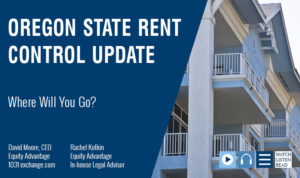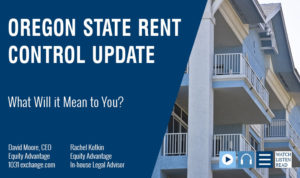David Moore of Equity Advantage and Robert Smith of Peregrine Private Capital have been warning income property investors for some time now about the possibility of nationwide rent control. It was the conclusion we were forced to in the wake of governments eviction moratorium and the Biden Administrations unlawful attempt to extend it.
With government’s lockdown of the economy and virtual seizure of housing assets, (albeit temporarily) a line was crossed. It arrogated to itself a degree of economic power without precedent. As with Julius Caesar, once the Rubicon is crossed there is no going back.
Learn more about the effects and consequences legislation could have going forward for income property investors.
Read the Full TranscriptDavid Moore: Hello, David Moore with Equity Advantage. I’ve got Robert Smith, from Peregrine Private Capital. And I guess I want to start this segment out saying, if at first you don’t succeed, try, try again. And you know what? Hey, this time it’s going to work. Well, we’ll throw this section into those two caveats, right?
So we’re going to talk a little bit about rent control, and we’ve been dealing with that topic on and off in a lot of the videos we’ve done with you guys, and typically we’re looking at cities that are putting things in place, and it always works so well. I mean, rent control’s got an amazing track record of success. Not.
But so now we’ve got a situation where… And actually you may have had to deal with it through the Covid times too, where you’ve got a situation where the government’s just basically telling the tenants they don’t have to pay, and now we’re in a situation where we’ve got inflationary times and the index numbers are actually allowing rents to go up higher.
But it really amazes me how these people that are making these rules really just don’t study history and look at what’s going on and what’s happened any place rent control’s been put in place. But you want to sort of hit this because now we’re looking at national, the potential to have a national rent control.
Robert Smith: Yeah. Most investors aren’t aware of it yet, and I think we can speak to this with some authority because Oregon two years ago became the first ever all rent control state. And as David just mentioned, there are few things that have a worse effect or worse impact on housing than rent control. I think the only way you can better devastate a housing market is by carpet bombing. And so… But this is… These bad ideas, and they are bad ideas that originate on the lunatic fringe of our left polity, unfortunately have a way of becoming mainstream very quickly with the current administration.
Robert Smith: And several weeks ago, I think something like 50 congressmen and women sent a letter to President Biden demanding action in terms of national rent control to, quote, “Eliminate corporate gouging and to provide housing for the indigent during the winter months.” And the Biden administration grabbed the ball and is running with it as fast as it possibly can out through the end zone… To the end zone using the offices of Freddie Mae and… Or Fannie Mae and Freddie Mac. And so there is a very real possibility of rent control being imposed on a national basis.
Robert Smith: And this was actually… We came to the conclusion that this was inevitable when government crossed the line during the pandemic and unilaterally imposed an eviction moratorium on all rental housing in the United States. And that was a line that the government had not crossed before in terms of appropriating to itself powers and money otherwise dedicated to the private sector. And so the conclusion that we were forced to draw from that is once this is over and the Biden administration unlawfully tried to extend it, which was then struck down, the next obvious thing is national rent control.
And this is why we’ve been encouraging people to look at other asset types than just multi-family because obviously multi-family, it’s full of people, people vote. So the political class is strongly incentivized to stick its long regulatory nose into that sector, whereas things like… And we’ll get back to self-storage. Self-storage doesn’t have people, it just has people’s junk and junk doesn’t vote, and because junk doesn’t vote, the political class is not incentivized to try to regulate it.
So we think in light of the movement towards national rent control, which is coming, okay, investors are wise to start looking at other asset types, property types that may be not yet on the political radar screen or lower on that radar screen.
David Moore: You think about on a national basis, you can understand where regionally you could have somebody that understands something in a regional basis, but how do you put in play nationally with all the different variables that are in play, any set of rule that would make any sense whatsoever? But I guess well that’s a ridiculous question.
Robert Smith: Yeah. That’s obviously a rhetorical question. You don’t, you can’t, but just in that letter directed by Congress to the president saying, “We seek to eliminate corporate price gouging in the housing sector.” That tells you how little the political class knows about housing. The vast majority of rental housing in the United States, whether it’s a duplex, a small apartment building, are still owned and operated by mom and pops. So you have a group of people that is profoundly ignorant about a sector of the economy, attempting to impose their will. And the operative word here is impose because they can’t legislate it, and if they can’t legislate it, then they fall back on the executive branch of government to mandate it be executive fiat. But you have the ignorant trying to regulate something that they know absolutely nothing about.
David Moore: What’s interesting to me is that you’ve got a situation… We’ve always said about 64% of the properties on the market could or should be Exchanged. Then you think about, “Okay, what does not fit Section 1031?” And you could say, “Well, a primary residence doesn’t.” But if you’ve been on our videos in the past, which you obviously have, but those of you in the audience, how many times have we talked about a primary residence and the gains being access to the 250 or 500 and have to do a portion of your home as 1031 or literally converting your home to 1031. So there are lots of reasons primary residence, but going back and forth on stuff. So the only things that really don’t fit are something that’s taken, I mean, you’d want to use, as I said earlier, 1033 instead of 1031 in voluntary conversion if you had that opportunity. But the things that don’t fit 1031 are really a primary residence or properties that have been held for resale. And you start looking, back to your point, on who owns these things and who does it impact.
David Moore: What I see, you look at the… The point of this thing is properties need to move. Market velocity is good for everybody. If properties sit on the market, you can see where especially with rent control situations, the current owners just won’t spend the money on the property, they can’t afford to. So anytime a transaction happens, and this is one of the big arguments for 1031 is you gotta keep it in place because it’s going to help probably the bottom end of the real estate market more than any others because anytime you got a transaction, the buyer’s putting money into the project helping things go.
David Moore: But the thing that’s so tough for me to see is that all the mom and pops that you talk about that I’ve dealt with for over 30 years, I’ve watched them build these nice portfolios of property, now they’re the bad guy. And these are just regular people and they might only have these income properties, that’s all they’ve got, and yet their rights are being stripped and they’re really going to be refugees.
And what’s interesting is the regional governments, really they’re just taking ownership out of the region and giving it back to actually Wall Street in a lot of cases with the institutional money coming in to buy stuff. So it’s interesting because you’re going for mom and pops that care about their tenants, the money stays local, the ownership stays local to just kicking it offshore.
As I said, 75% of the buildings sold last year were from out of the area. Well, those owners aren’t here, they’re not in the cities, they’re not in the service organizations, they’re not taken care of in helping this regional area. It all goes someplace else. But that rent control is just going to take the affordability for the average person out of their hands and they’re not going to be able to deal with it anymore.
Robert Smith: They’re not going to be able to deal with it anymore and it will discourage investment, it will discourage improvement, it will discourage building. There’s an old saying that the road to hell is paved with good intentions and as you just said, the intention was to make originally on the part of the political class was to make landlords more responsive to renter’s needs and it’s actually having exactly the opposite effect driving ownership from the retail level to the institutional level, which is far, far away, much less responsive and simply…
David Moore: Less compassionate.
Robert Smith: And less compassionate. So it’s having, it will… It has had exactly the opposite effect and it will have exactly the opposite effect desired.
David Moore: Pretty interesting.
Robert Smith: Yeah.
David Moore: Oh, Rush Limbaugh used to ask what the government does well and why we keep giving them more to do. So anyway. We’ll be right back. David Moore and Robert Smith, thank you for joining us today.
To stay up to date with our video content subscribe to our YouTube channel.
The Guys With All The Answers…
 David and Thomas Moore, the co-founders of Equity Advantage & IRA Advantage
David and Thomas Moore, the co-founders of Equity Advantage & IRA Advantage
Whether working through a 1031 Exchange with Equity Advantage, acquiring real estate with an IRA through IRA Advantage or listing investment property through our Post 1031 property listing site, we are here to help Investors get where they want to be. Call them today! 503-635-1031.
Related Posts
-
Kicking Off the Fight for 1031 Exchanges Once Again
The Treasury Department Green Book, which was released yesterday afternoon, fleshes out the details of…
-
Oregon's Rent Control: Where Will You Go?
David Moore of Equity/IRA Advantage talks with in-house legal advisor Rachel Kotkin about DST, NNN,…
-
Oregon Statewide Rent Control Update: What Will It Mean To You?
David Moore of Equity Vantage IRA Advantage talks with in-house legal advisor Rachel Kotkin about…









